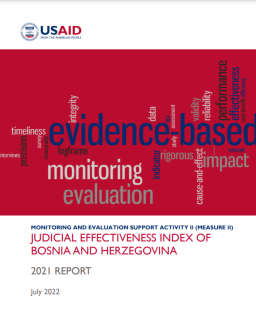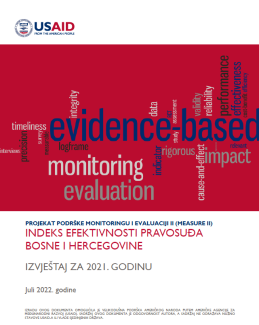This report presents the results of the 2021 Judicial Effectiveness Index of Bosnia and Herzegovina (JEI-BiH), which shows the state of the judiciary in the year 2021. The results of the 2021 JEI-BiH were achieved using the same methodologies for data collection as the previous six editions of the JEI-BiH. The research team based their holistic assessment of the BiH judiciary’s effectiveness on the same three data sources: (1) the National Survey of Citizens’ Perceptions in Bosnia and Herzegovina (NSCP-BiH), a survey of public perceptions, (2) the Survey of Judges and Prosecutors (SJP) in Bosnia and Herzegovina, and (3) administrative data on the major case types processed by first and second instance courts and prosecutors’ offices (POs), provided by the High Judicial and Prosecutorial Council (HJPC) of Bosnia and Herzegovina.1 The NSCP-BiH was conducted in January and February 2022, and the SJP in February 2022. HJPC administrative data covered major types of cases that were in the judicial system between January 1 and December 31, 2021, except for eight manually collected indicators that are available only with a time lag. In this report, those indicators are based on 2020 data, as the data for 2021 were not available at the time this report was completed.
The 2021 JEI-BiH results were challenged to some extent by these eight lagging HJPC administrative indicators. The research team paid particular attention to the distortion that these indicators caused and provided a detailed explanation of their effects on the overall JEI-BiH value. Moreover, one of the key recommendations of the 2021 JEI-BiH for the HJPC is to automate data collection for all important performance indicators of the BiH judiciary to avoid this problem in future JEI-BiH calculations.


